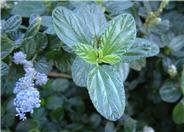
Common name:Yankee Point California Lilac
Botanical name:Ceanothus griseus hor. 'Yankee Point'
Yankee Point is a fast growing shrub that stays near 3 ft. in height with a spread of 6'. It has large bright green leaves and light blue flowers. It is great for banks and mass plantings. It does well on the coast and in hot inland areas. It attracts hummingbirds, butterflies and beneficial insects.
- Cornflower Farms

Common name:Golden Breath Of Heaven
Botanical name:Coleonema pulchrum 'Sunset Gold'
Sunset Gold Breath of Heaven is a fine textured, low growing shrub to 10 in. high and wide with bright yellow foliage. It is excellent for rock gardens. It is drought tolerant. -Cornflower Farms
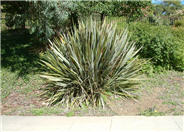
Common name:New Zealand Flax
Botanical name:Phormium tenax
New Zealand Flax is a large, bold plant with stiffly vertical, sword-like, green leaves that arise from its base. It should be grown under full sun for best color. Varieties will offer different growth habits and leaf color.
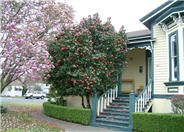
Common name:Japanese Camellia
Botanical name:Camellia japonica
An evergreen shrub or small tree, the Camellia japonica can reach 6-15' depending on the variety. It is intended for growth in part sun to shade, with average to little summer watering when established. They make excellent container plants. -Monterey Bay Nursery
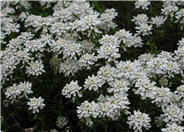
Common name:Evergreen Candytuft
Botanical name:Iberis sempervirens
This Evergreen Candytuft is a compact plant that grows 12-18" tall. Its leaves are dark green in color, and in the early spring it exhibits clusters of pure white flowers that are borne at branch ends.
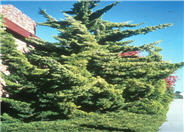
Common name:Hollywood Twisted Juniper, Hollywoo
Botanical name:Juniperus chinensis 'Kaizuka'
This wild-looking tree will give an artistic Japanese accent to any setting. It has an upright habit which includes broad, shrubby branches that spread irregularly but gracefully.
| Designer: | Hues of Green |
Photographer: GardenSoft |
Soils and Compost:
Incorporate compost 6" into your soil to retain water, reduce compaction, feed earthworms, and provide valuable nutrients to your plants.
Water Saving Tip:
Check your irrigation systems at least once per month (or after each mowing).
Monitor each cycle to identify obvious problems and to confirm that all of the components are functioning properly.
Contact your water agency for assistance.
Integrated Pest Management:
Drip and other smart irrigation delivers water directly to roots, allowing no excess water for weeds.

